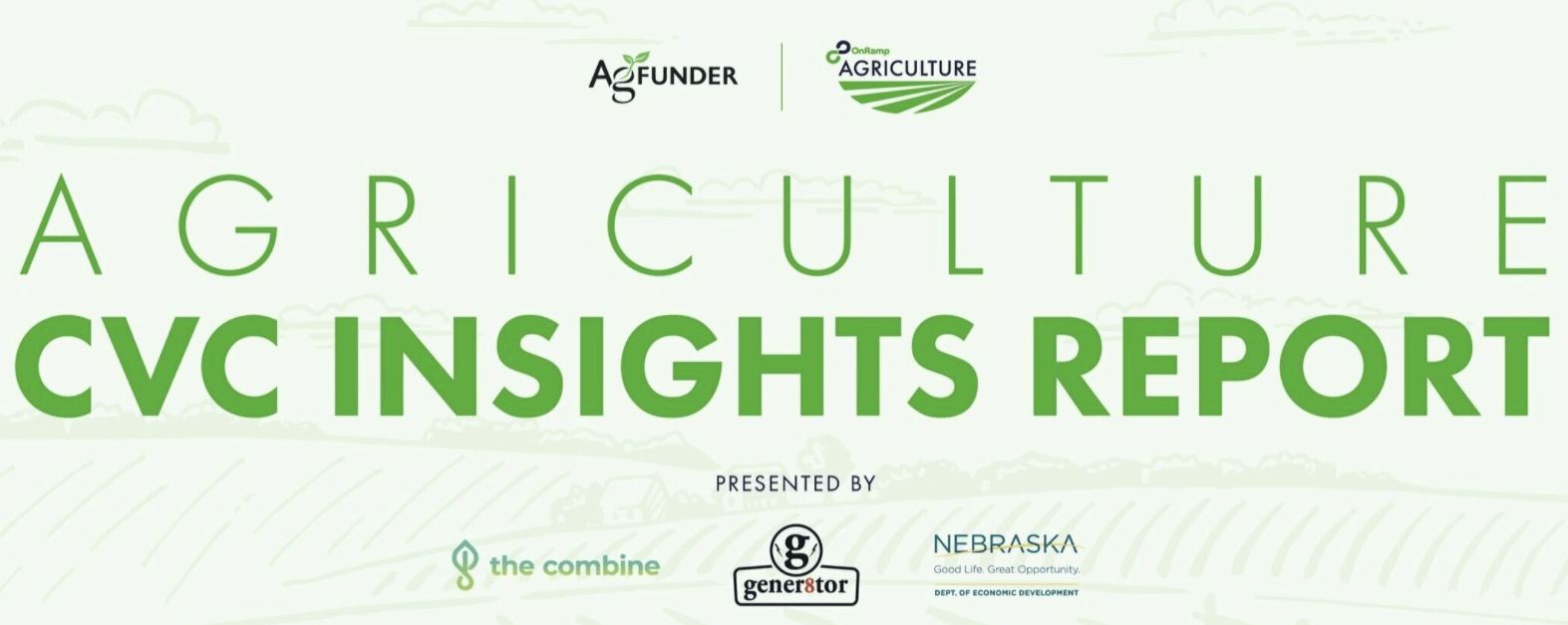Furious dealmaking in the agrifoodtech sector last year yielded a surprising result: in 12 months marked by immense uncertainty, agrifood investors took bigger risks. They backed cell-cultured meat startups, insect farms, biotech companies developing the next generation of seeds and crop inputs, and farm-bot makers – the kinds of capital-intensive technologies that take years and a lot of hard science to develop.
When the dollars and deals were tallied, emergent ‘deep tech’ companies had for the first time in seven years raised more funding than asset-light, software-centric startups, like retail and restaurant tech developers.
A series of familiar names kept resurfacing in the data: Syngenta, Bayer, Cargill, as well as other agribusiness and agrochemical giants otherwise known for developing such technologies in-house.
There’s nothing new about corporates investing directly in strategic technologies – but it is now a mainstream approach.
“Management has long been aware that going forward, a lot of innovation will come from digital technologies or technologies that sit outside our core research and development innovation engine,” Syngenta Group Ventures managing director Shubhang Shankar told AFN.
His team was among the earliest and most active corporate venture capital (CVC) players in agrifoodtech.
https://agfundernews.com/agtech-cvc-syngenta-ventures-on-chemchina-business-model-innovation-and-agri-fintech.html
“The idea was to use venturing as a vehicle to understand what’s out there in the near and medium-term, and how can we incorporate that into our growth strategy,” Shankar added.
Those sentiments were echoed by Markus Solibieda, managing director at BASF’s venture unit, BASF Venture Capital.
“We try to inspire our existing business units on new trends, new technologies, new business models. We are the risk-takers,” he said.
“We try to be a source of inspiration for [the wider company], which today still has a business model based on volumes.”
The competitive landscape in which these ag giants operate is changing fast. Regulators now frown upon farms that deploy environmentally destructive synthetic chemicals in a ‘spray and pray’ approach to crop protection in their fields. Consumers demand to know more about where their food comes from and how it was produced. And climate change is rendering long-standing farming practices ineffective if not obsolete.
“Consumers are voting with their dollars, and it is causing a ripple effect throughout the value chain,” said FMC Ventures managing director Amar Singh.
“Grocers, aggregators, processors, mid-stream actors, producers, and crop-input companies are reacting to seize the opportunities emerging from these changing preferences.”
https://agfundernews.com/agtech-cvc-fmc-ventures-on-launching-a-corporate-venture-group-in-2020.html
AFN‘s parent company AgFunder, in a research collaboration with gener8tor’s OnRamp Agriculture conference, interviewed CVC representatives from six major agribusiness and agrochemicals companies: ADM, Bayer, BASF, Cargill, FMC, and Syngenta. This group made more than 20 investments last year, and collectively, they’ve made more than 90 investments in 66 companies in the past five years.
Here are five takeaways from the report, available for download here:
1. Agrifood corporates are all-aboard the venture capital bandwagon
In 2015, agrifoodtech was a nascent sector, and ag corporates weren’t paying much attention to startups. Syngenta, Bayer, and Monsanto (which has since been acquired by Bayer) were among the only agrochemical companies in the VC game.
The following year, ADM established its own VC unit, ADM Ventures. Ag CVC deal flow really got going a year later as agrifoodtech investing soared more generally: the market jumped from $12.2 billion in 2017 to $20.2 billion in 2018, according to the most recent edition of AgFunder’s annual AgrifoodTech Investment Report.
FMC launched its venture arm mid-2020 and closed the year with four investments. “Our mission is to opportunistically back emerging technologies that can create strategic advantages for FMC,” explained Singh. “Leadership has tasked the ventures group with focusing on emerging technologies that could radically augment or alter how agriscience products are developed, sold and applied.”
SriRaj Kantamneni, managing director of digital insights at Cargill, added: “To be relevant, you evolve with what’s happening in the market.” Cargill told AFN earlier this year that it was consolidating and streamlining its venture investing activities from across its business units.
https://agfundernews.com/cargill-on-the-agrifood-industrys-reluctant-digital-shift.html
2. Agrifood CVCs skew towards biotech and other deep tech
Investments in the AgFunder-defined Ag Biotechnology category dominate the deal activity among the six CVCs we’ve profiled. That should be no surprise, given that these venture units represent some of the largest agrochemicals companies in the world.
Ag biotech investing among CVCs far exceeds the average across the broader segment of agrifoodtech investors, accounting for 47.3% of investment rounds versus just 6% industry-wide.
Among the most notable deals were Leaps by Bayer’s backing of cover-crop seed producer CoverCress and Newleaf Symbiotics, which is commercializing a strain of bacteria found in ‘pink-pigmented facultative methylotrophs’ – naturally found in soil and freshwater with beneficial properties for certain types of plants. Leaps has made follow-on investments in both companies.
Syngenta Ventures’ backing of RNA research firm Greenlight Biosciences and Sound Agriculture, a molecular discovery platform focused on improving crops’ climate resilience, were also of note.
After Ag Biotech, the second biggest investment category was Farm Management Software, Sensing & IoT, underscoring agrifood CVCs’ focus on technologies closest to the farm.
3. There’s little appetite for very early-stage risk
Most of the CVCs in our sample are not cutting the first institutional checks to new, pre-seed, and seed-stage startups; rather, they are investing in Series A and B rounds.
“For most technologies, we find that it’s better to get involved once the technology itself is somewhat proven [and] helping the startup refine what it does to scale in the key markets where that technology could have an impact,” said Cargill’s Kantamneni.
Of the 92 deals in our sample, 44 were at the Series A and B stage, while only 10 were seed-stage investments.
ADM Ventures sees itself as an earlier-stage investor than many of its peers. “When we invest in startups, we typically like to come in as a minority investor at the Series A level,” said Victoria de la Huerga, former vice president of ADM Ventures. “We think: ‘How do we help de-risk what they’re doing, and are there competencies that make this a good partnership at the end of the day?'”
https://agfundernews.com/agtech-cvc-adm-ventures-on-the-many-ways-corporations-invest-in-innovators.html
4. There’s room in the market for collaborative competition
A handful of investments scored backing from multiple CVCs in our sample. Leaps by Bayer and Syngenta Ventures have both backed biological crop input developer AgBiome; farm robotics and remote sensing venture Blue River Technologies; and fungicide producer, Boragen.
The two CVCs got an exit from Blue River in 2017 when it was bought by another corporate giant in the agrifood space: John Deere.
Generally, however, most CVCs aren’t piling into the same deals. Cargill is the biggest investor in the Innovative Foods category, which includes alternative proteins. Its deals include cell-cultured meat companies Aleph Farms and UPSIDE Foods (previously Memphis Meats) and plant-based protein maker Puris.
BASF Venture Capital, meanwhile, is the only CVC in the sample investing in the Bioenergy & Biomaterials sector, backing companies like Lactips, which is using waste from the dairy sector as a packaging alternative. Interestingly, BASF Ventures does not count bioenergy and biomaterials-related investments as part of its agrifood portfolio internally.
5. CVCs are eager to prove their sustainable investing credentials
Amid growing scrutiny of the agriculture sector’s contribution to global warming, agrifood majors are trying to broadcast climate-positive transformation. They’re leaning on their CVC activity as a way to showcase their commitment.
“We’ve always been defined as an impact investor, so our investments not only target breakthrough technologies, but also specific challenges that would have a positive impact on society and humanity,” said Leaps by Bayer’s vice president of venture investments, Derek Norman. “We very much screen for that when we’re looking at investment opportunities.”
https://agfundernews.com/leaps-by-bayer-on-pursuing-an-impact-lens-for-corporate-agtech-innovation.html
A favorite example from the firm’s portfolio is CoverCress, which is converting a wild plant called pennycress into a commercial cover crop that both improves soil health and serves as a cash crop for farmers in the winter months.
“They’re taking a plant that’s never been farmed and creating a completely new commercial crop that would have a major positive environmental impact,” Norman said, describing the investment as “a breakthrough.”
Leaps by Bayer acquired Monsanto Growth Ventures’ stake in CoverCress when Bayer completed its acquisition of Monsanto in 2018. It has since made follow-on investments in the startup.
FMC Ventures is looking at technologies that can minimize the use of environmentally toxic synthetic chemicals in agriculture. “We are inquiring about different and sustainable ways to nourish and protect crops, and evaluating technologies with a very open mind – technologies that help us do more with less, whether that’s on the formulation side to reduce the amount of active ingredient, or using robotics for precision application,” Singh says.
One of FMC Ventures’ first investments is Guardian Agriculture, which is building an unmanned aerial sprayer to drive down costs and improve precision in crop spraying.
For Cargill, the company’s “mission” is to be “the global leader in nourishing people, and we want to do that in a safe, responsible, and sustainable way,” Kantamneni said. With farm management practices, he explained, “it’s about how the digital solutions and investments we’re making improve those practices because ultimately those improvements lead to greater sustainability, efficiency, and efficacy.” On the nutrition side, Cargill’s VC focus is on monitoring and measuring to address sustainability and consumer preferences.
Talking about sustainability is a necessity for large agrifood companies today, in large part because that is where most agrifood innovation is now focused. Kantamneni observed that venture investing is how large corporations keep their finger on the pulse of new trends and innovation.
“We’re going to see some tremendous change over the next three to five years,” he said. “There are startups out there that we don’t know about that are waking up every day thinking about this. Sometimes having disruption forced upon the industry is a good thing.”






